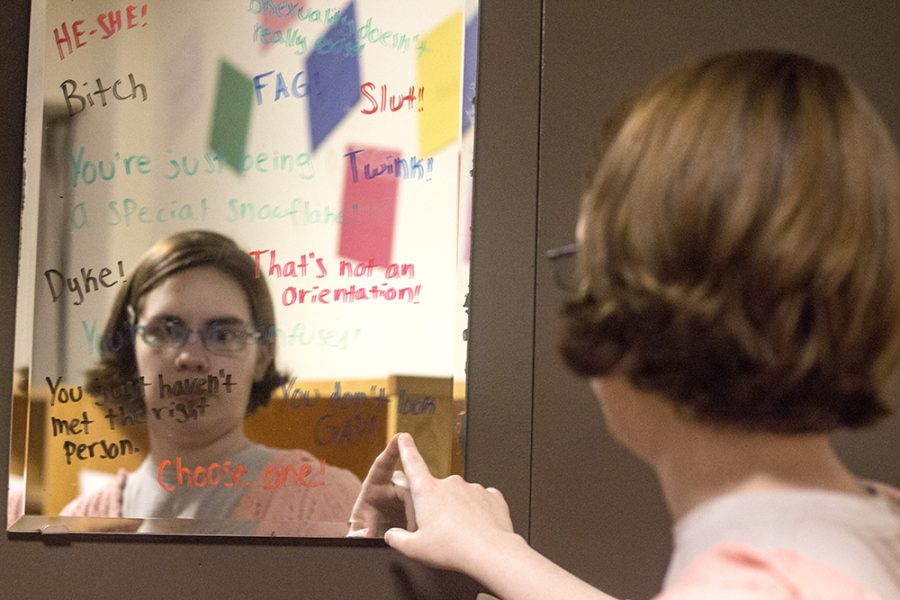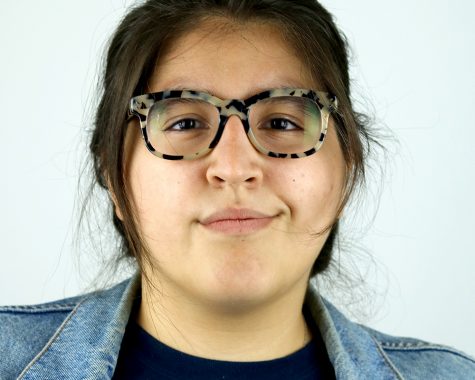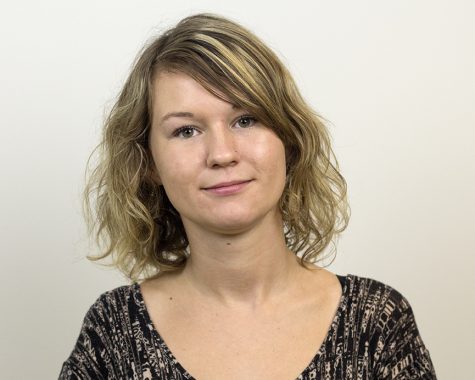Students traverse tunnel to learn about oppression
Lee Harper, a senior pshychology major,stares into a mirror with derogatory phrases sorrounding the LGBT community. “As an asexual person I get the ‘you just haven’t met the right person yet.’ People just don’t understand,” says Harper.
March 28, 2017
An unused floor of Taylor Hall featured facts about different forms of oppression and oppressed groups Tuesday.
Marissa Damore, vice president of committee engagement, worked with volunteers to post information in the bathroom, the lounge and three dorm rooms on the north tower’s fifth floor.
Groups of students went from room to room in the “Tunnel of Oppression,” reading about mental illness, the effects of poverty and various types of gender and sexual identities.
Some learned something new along the way. Wade Morrison, a sophomore geography major, wondered what it meant to be aromantic (lacking romantic feelings) and omnisexual (attraction to any gender or sexual orientation).
“I thought I knew a lot when it comes to diversity, but apparently I don’t,” Morrison said. “It’s humbling.”
Derogatory terms, phrases and sayings lined the mirror in one room. These included “f-g,” “sl-t,” “no homo,” “that’s not an orientation” and “you’re just being a special snowflake.”
The names of various sexualities and genders riddled the walls of the room with the marked mirror. Among “omnisexual” and “aromantic” were “lesbian,” “transgender” and “queer.” A poster with concealed answers enabled students to quiz themselves on LGBT+ flags.
The bathroom was dedicated to body image. On the left-hand mirror, volunteers had used multiple colors of marker to write self-shaming messages such as “freckle face” and “I’m too fat.” The left-hand mirror had the polar opposites of each message, including “sun-kissed” and “my curves are beautiful.”
Dominique Dickerson, a freshman sociology major, voiced her surprise at the messages on the left-hand mirror.
“Jesus,” Dickerson said. “Most of this stuff I’ve been called.”
The bathroom walls had more inspirational messages.
“Fall in love with yourself,” the papers read. “The next time you think of beautiful things, don’t forget to count yourself. Be kind to yourself.”
The room dedicated to poverty hit home for Keshyra Bluminberg, a freshman psychology major.
“I used to be homeless,” Bluminberg said, reading statistics about shelters and hunger. “People don’t know how dire it is.”
According to the facts volunteers posted on the furniture, windows and walls, less than 10 million children get to eat breakfast each morning. The U.S. wastes 40 percent of its food, worth $168 billion, each year. Our nation’s emergency need for food has increased 91 percent since 2008.
The walls of the lounge featured information about mental illness. Volunteers wrote that one can help by supporting constructive legislation and being accepting of those who suffer from mental illness.
The volunteers also wrote that treatments for the mentally ill once included being locked up or chained to walls or furniture. Patients were also “treated” with leeches and bloodletting, and various religions regarded them as “witches” or “possessed.”
Medication for mental illnesses can be difficult to obtain, volunteers wrote. Side effects can be worse than the mental illnesses themselves, and children are generally regarded under two extremes; they are either forced to take medicine or told children cannot be mentally ill.
Like the mirror in the LGBT+ room, examples of derogatory terms, such as “screw-loose,” “insane” and “nuts,” lined the lounge window.
Dickerson used provided paper and markers to contribute her own message to the wall.
“Depression is an illness,” she wrote. “I will overcome!”
Another room was dedicated to microaggressions, sayings and phrases that, while usually meant to be positive, can be harmful. “You’re far too skinny” promotes negative body norms, and “Are you sure you’re not confused?” says those who identify as LGBT+ may not know themselves as well as someone else does.
The final room in the “Tunnel of Oppression” did not feature information but rather a counselor – namely Counseling Center intern Sheldon Aaron, a second-year graduate student studying clinical counseling.
Mallory Kutnick can be reached at 581-2812 or [email protected].



















































